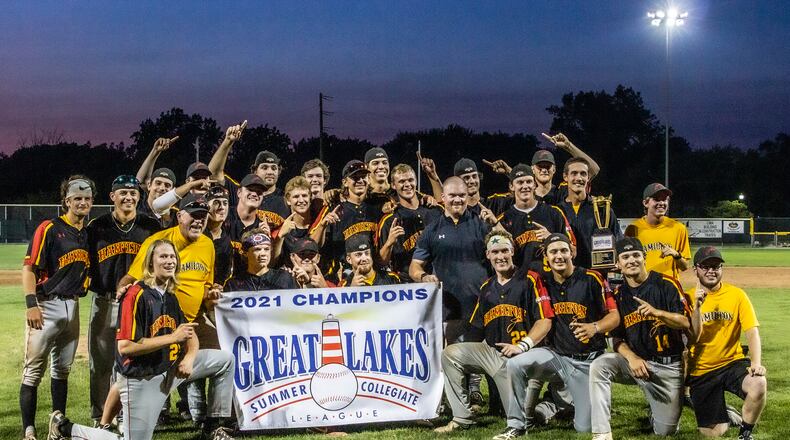Left-hander Sebastian Gongora, a Chaminade Julienne graduate, allowed four hits and one run in seven innings. Right-hander Chase Hopewell struck out five batters in two scoreless innings to lead the South Division-champion Joes to a 3-1 win over the North Division-champion Lima Locos in the decisive third game of the best-of-three championship round at Simmons Field in Lima.
“The guys came every day with a focus,” said first-year head coach Tyler Thamann, who played on Hamilton’s last championship team in 2016. “They were always ready to play. They came together as a team.”
Dawg Pile at Lima Locos pic.twitter.com/ay7bxaWfa8
— Hamilton Joes (@HamiltonJoes) August 2, 2021
Second baseman Colton Becker and designated hitter Evan Ulrich both had two hits in Hamilton’s win over the defending GLSCL champions, who won the league’s last title in 2019. Pandemic protocols forced cancellation of the 2020 season. This was the third championship for the Joes. They also won in 2010.
Paced by a pitching staff that led the league with a combined 3.93 ERA, Hamilton went 27-15 during the regular season. The Joes won seven of eight games before dropping their last two to end the regular season. They bounced back to knock off the South Division runner-up Richmond Jazz in the first round of the playoffs before facing Lima in the finals. The Joes finished fifth in the league with a combined .293 batting average.
“Richmond (Indiana) came out of nowhere,” Grissom said. “I thought it would be us in the South and Lima and the (Sandusky) Ice Haulers in the North.”
Right-hander Sam Klein led the pitching staff with a 5-0 record and 1.84 ERA, good for second in the league, in seven games. Grongora was 2-1 and third in the league with a 1.87 ERA in four starts and six relief appearances. Hopewell finished 3-1 with 1.98 ERA in 14 games, including two starts. Outfielder Harry Jackson hit .340 in 29 games.
Grissom felt one key for Hamilton’s resurgence after finishing fourth in the South with a 22-18 record in 2019 was the emergence of Sammy Sass at catcher. Sass, a Columbus native who plays at Wright State, batted .282 and led the team with five home runs in 30 games.
“I was nervous, but Sammy Sass turned out to be what I thought was the best player in the league,” Grissom said. “He was the designated hitter at Wright State. He didn’t catch all spring, so we didn’t know what to expect, but he exceeded all expectations. The pitchers followed his lead over the final six games. He had it figured out.”
Thamann believes another key to Hamilton’s success was the early season shift of Lebanon native and Wright State infielder Luke Arnold from shortstop to third base. Arnold hit just .248 but finished second on the team with 27 RBIs, one behind shortstop Garrett Staton.
“I think he made one error all year after we moved him to third base,” Thamann said.
“Really, I think our defense was way better than in the past,” Grissom said. “It kept us in close games. We turned a lot of double plays this year. That was an important key to us. It helps your pitching. If you get in trouble, you’re still just one pitch away. You can get a ground ball and get out of the inning.”
Last year’s COVID-19 issues led to unexpected consequences that Thamann noticed early in the season. Many of his players didn’t get much playing time with their college teams because of the extra year of eligibility granted by the NCAA to players who lost the 2020 season.
“I did not know that,” Thamann said. “Once we got together that first week, I started asking them how much they had played. When they told me, I was like, ‘Oh, crap. We have a lot of work to do.’ Once I heard that, I told them I would try to get them as many reps as possible to get them ready to play. We definitely got better at two-strike hitting. They struggled early.”
They flourished late.
About the Author

